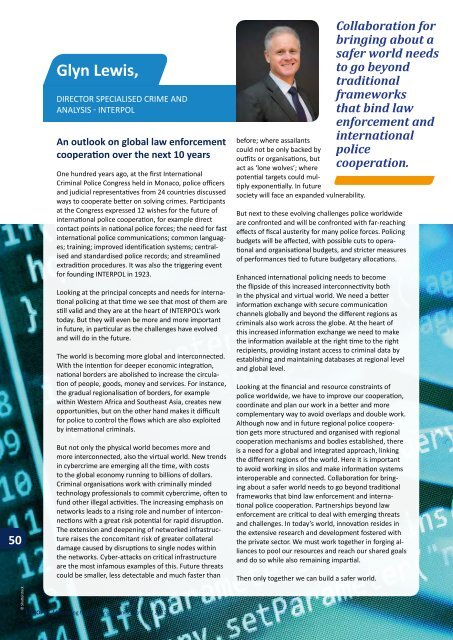eu-europol-org-crime-report
eu-europol-org-crime-report
eu-europol-org-crime-report
Create successful ePaper yourself
Turn your PDF publications into a flip-book with our unique Google optimized e-Paper software.
50<br />
Glyn Lewis,<br />
DIRECTOR SPECIALISED CRIME AND<br />
ANALYSIS - INTERPOL<br />
An outlook on global law enforcement<br />
cooperation over the next 10 years<br />
One hundred years ago, at the first International<br />
Criminal Police Congress held in Monaco, police officers<br />
and judicial representatives from 24 countries discussed<br />
ways to cooperate better on solving <strong>crime</strong>s. Participants<br />
at the Congress expressed 12 wishes for the future of<br />
international police cooperation, for example direct<br />
contact points in national police forces; the need for fast<br />
international police communications; common languages;<br />
training; improved identification systems; centralised<br />
and standardised police records; and streamlined<br />
extradition procedures. It was also the triggering event<br />
for founding INTERPOL in 1923.<br />
Looking at the principal concepts and needs for international<br />
policing at that time we see that most of them are<br />
still valid and they are at the heart of INTERPOL’s work<br />
today. But they will even be more and more important<br />
in future, in particular as the challenges have evolved<br />
and will do in the future.<br />
The world is becoming more global and interconnected.<br />
With the intention for deeper economic integration,<br />
national borders are abolished to increase the circulation<br />
of people, goods, money and services. For instance,<br />
the gradual regionalisation of borders, for example<br />
within Western Africa and Southeast Asia, creates new<br />
opportunities, but on the other hand makes it difficult<br />
for police to control the flows which are also exploited<br />
by international criminals.<br />
But not only the physical world becomes more and<br />
more interconnected, also the virtual world. New trends<br />
in cyber<strong>crime</strong> are emerging all the time, with costs<br />
to the global economy running to billions of dollars.<br />
Criminal <strong>org</strong>anisations work with criminally minded<br />
technology professionals to commit cyber<strong>crime</strong>, often to<br />
fund other illegal activities. The increasing emphasis on<br />
networks leads to a rising role and number of interconnections<br />
with a great risk potential for rapid disruption.<br />
The extension and deepening of networked infrastructure<br />
raises the concomitant risk of greater collateral<br />
damage caused by disruptions to single nodes within<br />
the networks. Cyber-attacks on critical infrastructure<br />
are the most infamous examples of this. Future threats<br />
could be smaller, less detectable and much faster than<br />
before; where assailants<br />
could not be only backed by<br />
outfits or <strong>org</strong>anisations, but<br />
act as ‘lone wolves’; where<br />
potential targets could multiply<br />
exponentially. In future<br />
society will face an expanded vulnerability.<br />
But next to these evolving challenges police worldwide<br />
are confronted and will be confronted with far-reaching<br />
effects of fiscal austerity for many police forces. Policing<br />
budgets will be affected, with possible cuts to operational<br />
and <strong>org</strong>anisational budgets, and stricter measures<br />
of performances tied to future budgetary allocations.<br />
Enhanced international policing needs to become<br />
the flipside of this increased interconnectivity both<br />
in the physical and virtual world. We need a better<br />
information exchange with secure communication<br />
channels globally and beyond the different regions as<br />
criminals also work across the globe. At the heart of<br />
this increased information exchange we need to make<br />
the information available at the right time to the right<br />
recipients, providing instant access to criminal data by<br />
establishing and maintaining databases at regional level<br />
and global level.<br />
Looking at the financial and resource constraints of<br />
police worldwide, we have to improve our cooperation,<br />
coordinate and plan our work in a better and more<br />
complementary way to avoid overlaps and double work.<br />
Although now and in future regional police cooperation<br />
gets more structured and <strong>org</strong>anised with regional<br />
cooperation mechanisms and bodies established, there<br />
is a need for a global and integrated approach, linking<br />
the different regions of the world. Here it is important<br />
to avoid working in silos and make information systems<br />
interoperable and connected. Collaboration for bringing<br />
about a safer world needs to go beyond traditional<br />
frameworks that bind law enforcement and international<br />
police cooperation. Partnerships beyond law<br />
enforcement are critical to deal with emerging threats<br />
and challenges. In today’s world, innovation resides in<br />
the extensive research and development fostered with<br />
the private sector. We must work together in f<strong>org</strong>ing alliances<br />
to pool our resources and reach our shared goals<br />
and do so while also remaining impartial.<br />
Then only together we can build a safer world.<br />
Collaboration for<br />
bringing about a<br />
safer world needs<br />
to go beyond<br />
traditional<br />
frameworks<br />
that bind law<br />
enforcement and<br />
international<br />
police<br />
cooperation.<br />
© Shutterstock<br />
EUROPOL / Exploring tomorrow’s <strong>org</strong>anised <strong>crime</strong> / 2015


